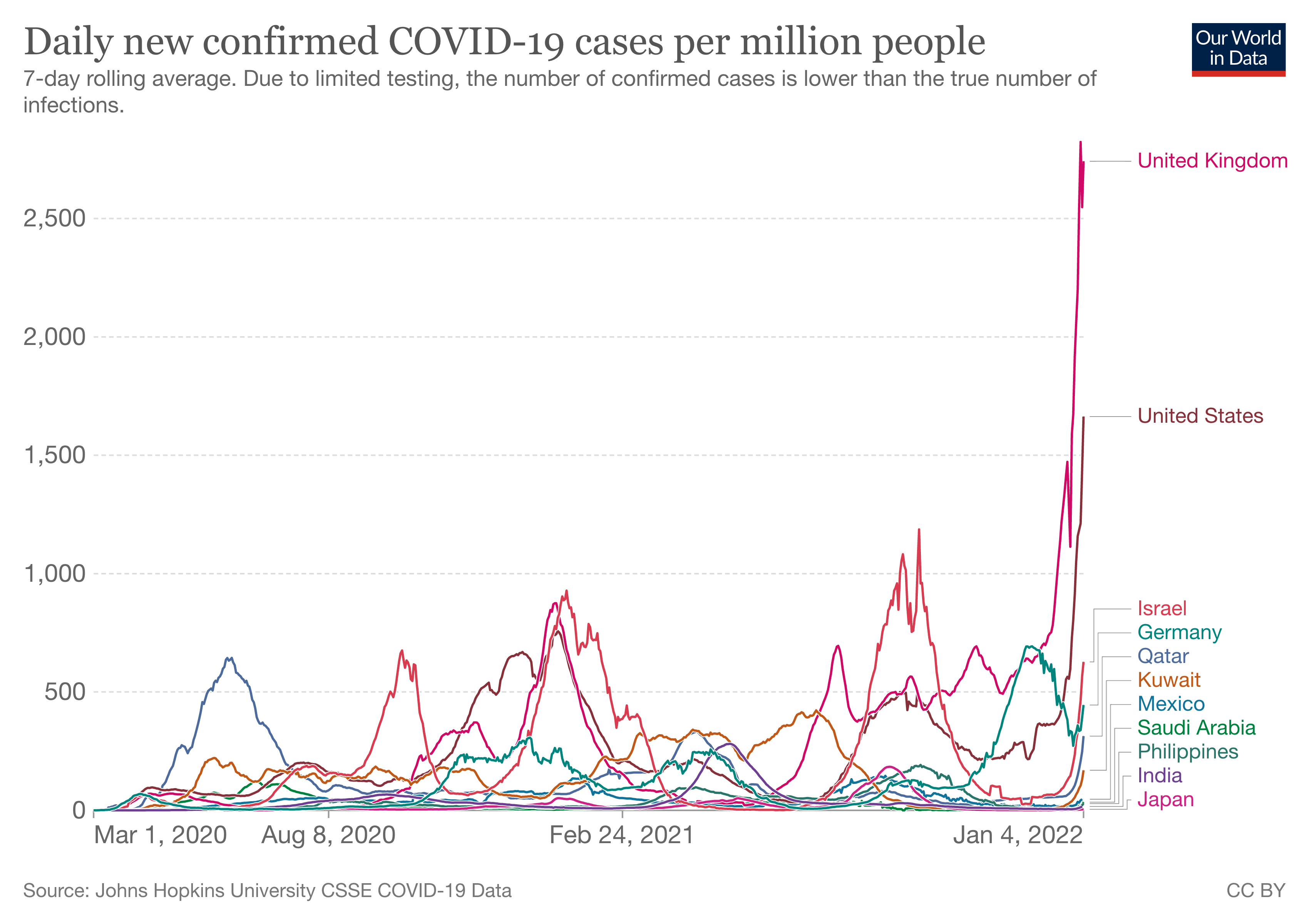COVID-19: What you need to know about the coronavirus pandemic on 5 January

Many countries have reintroduced mandatory mask wearing to tackle rising COVID-19 cases. Image: REUTERS/Heo Ran

Explore and monitor how COVID-19 is affecting economies, industries and global issues

Get involved with our crowdsourced digital platform to deliver impact at scale
Stay up to date:
COVID-19
Listen to the article
- This daily news round-up brings you a selection of the latest news and updates on the COVID-19 coronavirus pandemic, as well as tips and tools to help you stay informed and protected.
- Top stories: US reports nearly 1 million new COVID-19 infections; WHO sees more evidence that Omicron causes milder symptoms; countries around the world report rising COVID-19 cases.
1. How COVID-19 is affecting the globe
Confirmed cases of COVID-19 have passed 295.3 million globally, according to Johns Hopkins University. The number of confirmed deaths has now passed 5.45 million. More than 9.25 billion vaccination doses have been administered globally, according to Our World in Data.
Germany needs to offer COVID-19 vaccine booster shots to an additional 15 million people to slow the spread of Omicron, its health minister said in remarks published today.
Mexico's confirmed COVID-19 cases since the start of the pandemic have passed 4 million. However, authorities have said the real number is likely much higher.
The US government has doubled its order for Pfizer's oral COVID-19 antiviral treatment, providing a total of 20 million courses.
New COVID-19 cases have more than doubled in Japan's Okinawa region, with authorities considering imposing emergency steps to contain it.
Authorities in the Philippines have cancelled the annual 'Black Nazarene' parade for a second year as a result of concerns about COVID-19.
New COVID-19 cases have hit 58,097 in India, a doubling of the daily tally over the past four days.
A fourth dose of COVID-19 vaccine boosts antibodies five-fold a week after the shot is administered, Israeli Prime Minister Naftali Bennett said on Tuesday, citing preliminary findings of an Israeli study.
COVID-19 cases are rising across several Gulf states, with the daily number of cases more than doubling in Saudi Arabia over two days to more than 2,500 and crossing the 1,000-level in Qatar and Kuwait.
British Prime Minister Boris Johnson said yesterday that England could withstand a surge in COVID-19 infections without shutting down the economy, as Britain reported another record daily high in cases.

2. WHO sees more evidence that Omicron causes milder symptoms
More evidence is emerging that the Omicron COVID-19 variant is affecting the upper respiratory tract, causing milder symptoms than previous variants, a World Health Organization (WHO) official said yesterday.
"We are seeing more and more studies pointing out that Omicron is infecting the upper part of the body. Unlike other ones, the lungs ... would be causing severe pneumonia," WHO Incident Manager Abdi Mahamud told Geneva-based journalists.
"It can be good news, but we really require more studies to prove that."
While case numbers have surged to all-time records around the world, the hospitalization and death rates are often lower than at other phases in the pandemic.
"What we are seeing now is ... the decoupling between the cases and the deaths," he said.
3. US reports nearly 1 million new COVID-19 infections
The United States reported nearly 1 million new COVID-19 infections on Monday, the highest daily tally of any country in the world and nearly double the previous US peak set a week ago as the spread of the Omicron variant showed no signs of slowing.
The number of hospitalized COVID-19 patients has risen nearly 50% in the past week and now exceeds 100,000, according to data collected by Reuters, marking the first time that threshold has been reached in a year.
The latest surge, which forced waves of cancellations - from commercial airlines flights to Broadway shows - in recent weeks, was disrupting plans for public schools to welcome students back from winter vacation.
The 978,856 new infections documented on Monday included some cases tallied on Saturday and Sunday, when many states do not report.
The new variant was estimated to account for 95.4% of cases identified in the United States as of 1 January, the US Centers for Disease Control and Prevention (CDC) said yesterday.
What is the Global Alliance for Social Entrepreneurship?
Don't miss any update on this topic
Create a free account and access your personalized content collection with our latest publications and analyses.
License and Republishing
World Economic Forum articles may be republished in accordance with the Creative Commons Attribution-NonCommercial-NoDerivatives 4.0 International Public License, and in accordance with our Terms of Use.
The views expressed in this article are those of the author alone and not the World Economic Forum.
Related topics:
The Agenda Weekly
A weekly update of the most important issues driving the global agenda
You can unsubscribe at any time using the link in our emails. For more details, review our privacy policy.
More on COVID-19See all
Charlotte Edmond
January 8, 2024
Charlotte Edmond
October 11, 2023
Douglas Broom
August 8, 2023
Simon Nicholas Williams
May 9, 2023
Philip Clarke, Jack Pollard and Mara Violato
April 17, 2023





